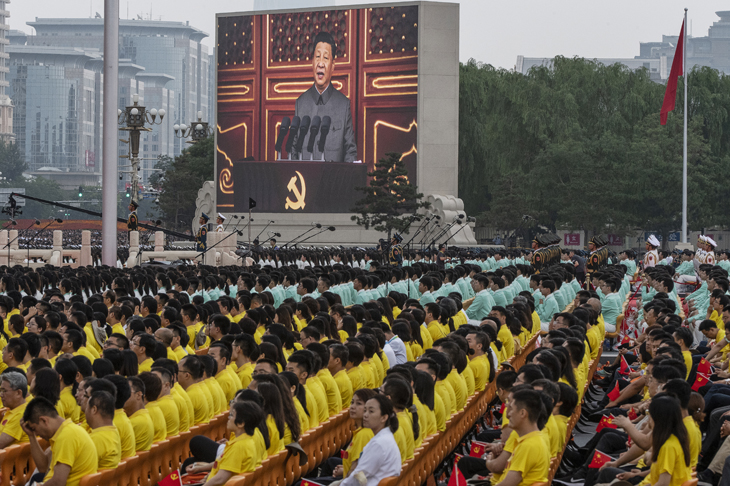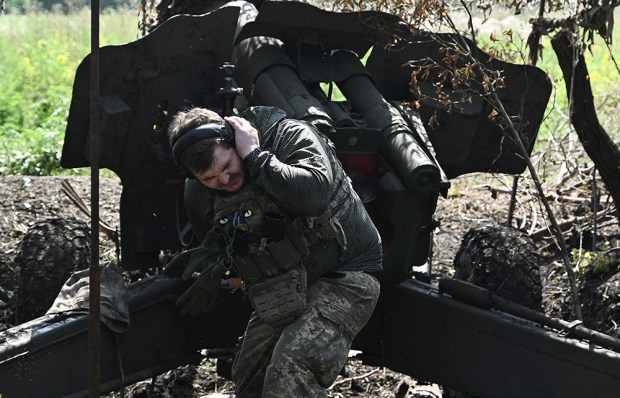Revisionist historians of the future will make a special note of Foreign Minister Marise Payne’s speech at the recent Australia China Business Council meeting. She expressed a forthright rejection of Beijing’s conditions for bringing about a thaw in Sino-Australian relations. Revisionists, from the 1960s onwards, blamed the United States and the West for initiating the Cold War, or what we might now Cold War I. Expect, perhaps sometime in the 2030s, a similar re-write of the origins Cold War 2.
Defenders of Payne will contend that mollifying Beijing by acceding to its notorious fourteen grievances would turn Australia into a vassal state of the PRC’s version of Imperial Japan’s Greater East Asia Co-Prosperity Sphere. Payne’s critics would – and do – condemn her for playing partisan politics ahead of the 2022 federal election. She sparked China’s shadow trade war against Australia with her call, in April last year, for an independent inquiry into the genesis of Sars-CoV-2. And now – as the Rudds of the world might say – she is doubling down on her earlier lapse of judgement.
Our future historians will have to acknowledge the existence of the fourteen grievances and the implicit demand that our politicians and journalists shut up if they have nothing positive to say about Team Xi. On the other hand, they can elect to downplay the fourteen grievances. They will, if their Cold War I antecedents are anything to go by, detect a bigger picture. Their ‘broader view’ will discern that it was not in Xi Jinping’s interest to initiate a cold war and that, for the most part, he condemned the idea of another cold war.
This seeming high-mindedness of Helmsman Xi echoes the anti-Cold War rhetoric of Generalissimo Stalin during March 1946. Stalin spoke the language of peaceful co-existence long before Khrushchev replaced him in the 1950s. Only after Churchill’s Iron Curtain speech did Stalin accuse the English-speaking world of ‘war mongering’ and ‘imperialist racism’. Analogously, China responded to the recent allegations by the United States, Canada, Australia, Japan, New Zealand the European Union and NATO of sponsoring a global hacking spree with counterfeit consternation. As the inestimable Global Times put it: ‘If today’s US wants to keep its strength by scolding and framing another major country, history will teach it a lesson’.
There is an abundance of evidence, as the revisionist rightly asserted, to suggest that Joseph Stalin did not, in the first instance, seek a showdown with Washington, its key partner in the Grand Alliance against Hitler. For instance, the size of the Red Army was reduced in the immediate aftermath of the war, the Soviet economy lay in ruins and needed repair, only the Americans possessed weapons of mass destruction (until 1949) and, not least, Stalin’s ambition was to commandeer the entirety of occupied Germany rather than the relatively poor Soviet zone in the east.
The revisionists made the mistake of thinking that Stalin not wanting a cold war is compatible with Stalin triggering a cold war. The genesis of forty-five years of superpower rivalry was the inability of Soviets to share with their erstwhile allies the common space of occupied Germany. The Soviets were given a free hand in Poland, Hungary, Bulgaria et al. and the Western powers averted their eyes. Why? Because they could. It was a different matter when Moscow’s sphere of influence – Berlin/Germany – overlapped with Washington’s sphere of influence. NATO and the Warsaw Pact and all the other dualistic features of the Cold War began with the incapacity of totalitarians to share a common space.
The People’s Republic of China’s sphere of influence, in the years before it was admitted to the United Nations, the World Trade Organisation, the World Health Organisation and so on, was restricted to its own borders. The Chinese Communist Party, paranoid and belligerent in equal measure, has tortured, incarcerated, or murdered every self-determining entity with the misfortune to be within its sphere of influence; independent scholars and writers of the early 1950s to the Tibetans, Uighurs, and Hongkongers of today. From Mao Zedong to Xi Jinping, the goal of the one-party state has been to create a ‘New China’ based on intra-national harmony; the reality, inevitably, has been fear and submission. Now, alas, it’s time for a ‘New World’.
Today the CCP’s sphere of influence stretches beyond Tibet and Xinjiang to the South China Sea, the Himalayan plateau, the Arctic region, cyberspace, the global economy, Australia’s sovereignty, Africa and so on ad infinitum.
Now even the contaminated air we breathe through our ubiquitous mask reeks of the CCP, but we must not protect ourselves from a prospective Sars-CoV-3 by calling for an independent inquiry – that would be ‘war mongering’ and ‘imperialist racism’.
And if we do attempt to organise ourselves, belatedly, against ‘National Socialism with Chinese characteristics’, by joining the Quadrilateral Alliance or buying back Darwin Port, revisionist historians will look back and denounce us as cold warriors.
To substantiate their narrative, they might point to the many splendid speeches delivered at the recent World Peace Forum in Beijing, including one delivered (in virtual form) by our very own Kevin Rudd, titled ‘Safeguarding World Peace: Managing US-China Strategic Competition’. There were many other fine sentiments expressed at the conference about ‘international security co-operation’, ‘upholding and practising multilateralism’ and so on and so forth.
A week later, of course, Beijing was threatening to nuke Japan if it intervened in any forthcoming invasion of Taiwan. A video sanctioned by the CCP said: ‘We will use nuclear bombs. We will use nuclear bombs continuously. We will do so until Japan declares unconditional surrender for a second time’. One way, I suppose, of upholding and practising multilateralism.
George F. Kennan warned, back in 1946, that the West needed to aspire to a new level of self-awareness, a recognition that our defining characteristic happens to be individual liberty and the rule of law – Western innovations that had no place in the Soviet Union and even less so, if that were possible, in the People’s Republic of China.
Amid our superfluity of confinements and lockdowns, there is one form of containment that we should all endorse: let us, before matters get completely out of hand, quarantine Xi Jinping and the CCP from our lives forever.
Got something to add? Join the discussion and comment below.
Get 10 issues for just $10
Subscribe to The Spectator Australia today for the next 10 magazine issues, plus full online access, for just $10.
You might disagree with half of it, but you’ll enjoy reading all of it. Try your first month for free, then just $2 a week for the remainder of your first year.














Comments
Don't miss out
Join the conversation with other Spectator Australia readers. Subscribe to leave a comment.
SUBSCRIBEAlready a subscriber? Log in